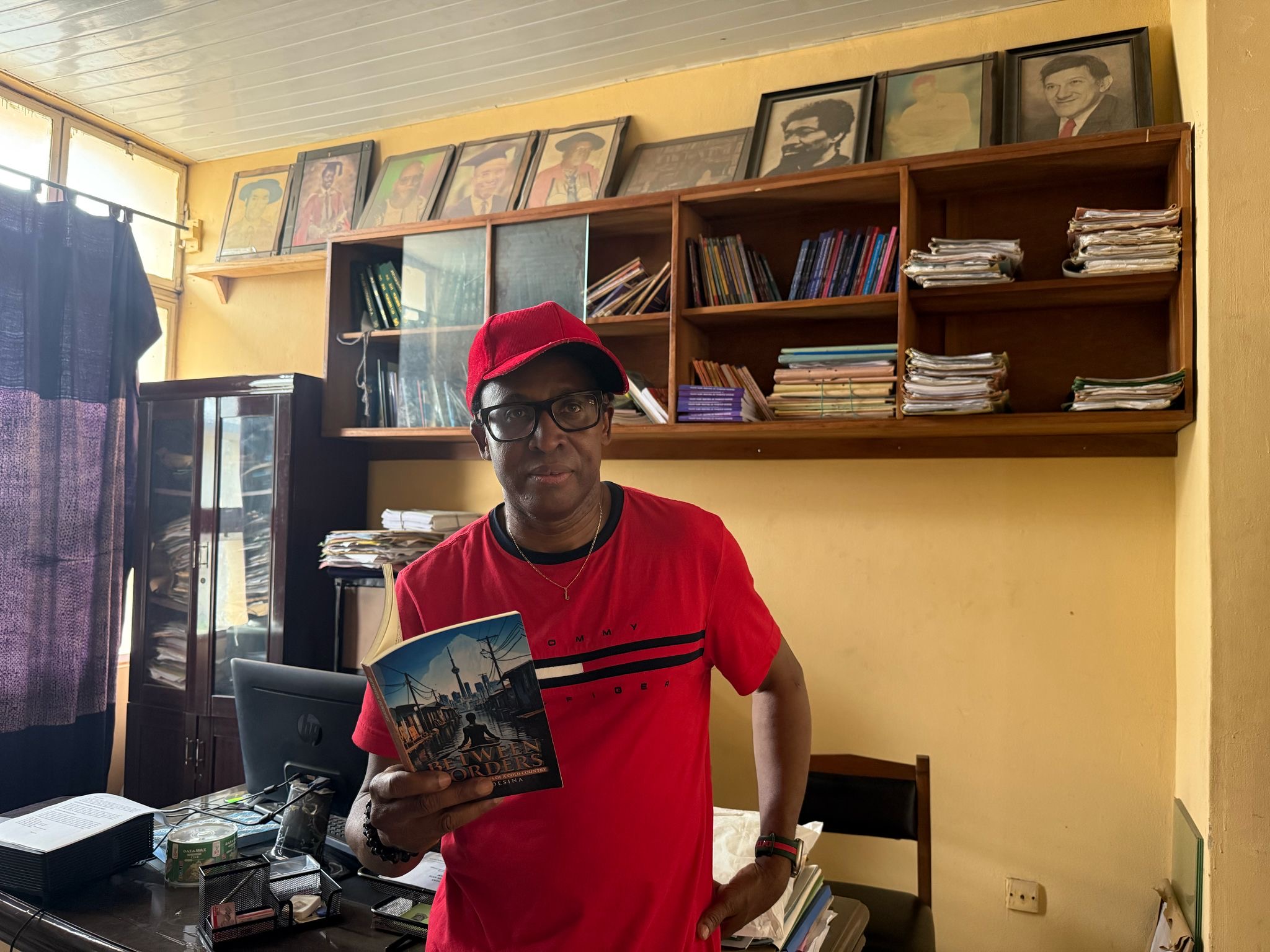Introduction: A Tale of Displacement and Triumph
 Jide Adesina’s Between Borders: Lost in the Shadows of a Cold Country is a profound narrative that transcends the boundaries of fiction, emerging as a compelling discourse on poverty, migration, and the indomitable human spirit. Centered on Ade, a young visionary from the floating slums of Makoko in Lagos, the novel is both a harrowing chronicle of systemic oppression and an inspiring testament to resilience.
Jide Adesina’s Between Borders: Lost in the Shadows of a Cold Country is a profound narrative that transcends the boundaries of fiction, emerging as a compelling discourse on poverty, migration, and the indomitable human spirit. Centered on Ade, a young visionary from the floating slums of Makoko in Lagos, the novel is both a harrowing chronicle of systemic oppression and an inspiring testament to resilience.
This work is not merely a story—it is a manifesto for climate justice, urban sustainability, and the reclamation of identity. Ade’s odyssey from the marginalized waterways of Nigeria to the unforgiving landscapes of Canada and back again serves as a microcosm of global migration struggles, offering a searing critique of institutional indifference while celebrating the transformative power of perseverance.
Narrative Arc: From Desolation to Redemption
The novel opens in Makoko, a labyrinthine slum suspended above Lagos’s murky waters, where Ade is raised by his mother, a tenacious fish trader. Amidst environmental degradation and economic despair, Ade nurtures an audacious dream: to reinvent Makoko as the “Venice of Africa,” a beacon of sustainable aquatic urbanism.
Driven by ambition, he embarks on a treacherous journey to Canada, only to confront the brutal realities of systemic exclusion. Despite his intellect and determination, he is ensnared in the dehumanizing machinery of immigration bureaucracy, culminating in his deportation. Stripped of dignity and separated from his son, Ade returns to Nigeria, shattered yet unbroken.
What follows is a narrative of redemption. Reclaiming his roots, Ade channels his anguish into innovation, spearheading Makoko’s metamorphosis into a model of ecological and architectural ingenuity. His efforts garner international acclaim, leading to an ironic twist of fate: Canada, once the architect of his exile, later bestows upon him citizenship and appoints him as an ambassador for climate resilience.
Thematic Underpinnings: A Scholarly Examination
1. Systemic Oppression and the Resilience of the Marginalized
Adesina’s work interrogates the structural forces that perpetuate poverty and displacement. Ade’s trajectory—from eviction threats in Makoko to racialized exclusion in Canada—exemplifies the cyclical violence of systemic neglect. Yet, the novel resists fatalism, positing that visionary leadership and community solidarity can dismantle even the most entrenched inequities.
2. Migration as an Act of Reclamation
The novel reframes migration beyond mere survival, presenting it as a radical assertion of agency. Ade’s deportation, rather than marking an endpoint, becomes a catalyst for reinvention. His return to Makoko underscores a central thesis: that true belonging is not conferred by borders but forged through purpose.
3. Slum Urbanism as a Blueprint for Sustainability
Ade’s ambition to transform Makoko into a floating city challenges prevailing narratives that dismiss slums as blights. Instead, the novel posits informal settlements as crucibles of innovation, where indigenous knowledge intersects with climate adaptation. This vision aligns with contemporary discourses on sustainable urbanism, advocating for policies that empower rather than erase marginalized communities.
4. The Fractured and Reconstructed Family
At its core, Between Borders is a meditation on kinship. Ade’s separation from his son underscores the emotional toll of migration, while his eventual reunion—both with his child and his community—serves as a poignant allegory for healing. The narrative insists that justice is not merely institutional but deeply personal, rooted in the restoration of broken bonds.
Global and Policy Relevance: Aligning with the UN SDGs
Adesina’s novel is a literary companion to the United Nations Sustainable Development Goals (SDGs), offering narrative depth to abstract policy objectives:
– SDG 1 (No Poverty): Ade’s ascent from extreme deprivation exemplifies how grassroots ingenuity can disrupt poverty cycles.
– SDG 10 (Reduced Inequalities): The novel lays bare the mechanisms of exclusion—xenophobia, bureaucratic violence—while advocating for equitable systems.
– SDG 11 (Sustainable Cities): Makoko’s rebirth presents a paradigm for inclusive urban planning, where informal settlements drive ecological innovation.
– SDG 13 (Climate Action): Ade’s recognition as a climate ambassador underscores the centrality of local knowledge in global sustainability efforts.
Academic and Pedagogical Applications
*Between Borders is an indispensable text across disciplines:
– Migration Studies: The novel humanizes statistical trends, offering a visceral account of displacement.
– Urban Sociology: Ade’s urban experiments challenge orthodox planning, advocating for slum-upgrading frameworks.
– Postcolonial Literature : The work engages with legacies of colonialism, interrogating how geopolitical hierarchies persist in migration policies.
– Environmental Humanities: By centering Makoko’s ecological precarity, the novel bridges climate discourse with social justice.
Authorial Context: Jide Adesina’s Interdisciplinary Vision
 Jide Adesina is a polymath whose expertise spans literature, cybersecurity, legal research, and climate advocacy. His oeuvre—including 1st Afrika, Hall of Fame International Magazine, and the forthcoming The Rise and Fall of Abucher, reflects a commitment to intersectional storytelling. A recipient of the Maximum MVP Award from the New York State of Health and the IBEW Human Rights Activist Committee, Adesina merges artistic brilliance with policy-driven activism.
Jide Adesina is a polymath whose expertise spans literature, cybersecurity, legal research, and climate advocacy. His oeuvre—including 1st Afrika, Hall of Fame International Magazine, and the forthcoming The Rise and Fall of Abucher, reflects a commitment to intersectional storytelling. A recipient of the Maximum MVP Award from the New York State of Health and the IBEW Human Rights Activist Committee, Adesina merges artistic brilliance with policy-driven activism.
Conclusion: A Canonical Work for the Anthropocene
Between Borders: Lost in the Shadows of a Cold Country is more than a novel—it is a clarion call. It demands that we reconceive borders not as barriers but as bridges, that we view slums not as problems but as solutions, and that we recognize migrants not as burdens but as bearers of transformative potential.
Adesina’s masterpiece belongs in the pantheon of global literature, not only for its narrative prowess but for its capacity to inspire policy shifts, pedagogical innovation, and, above all, collective action. It is a beacon for the borderless generation, reminding us that no shadow, however cold, can extinguish the light of resilience.
This is a story for the world. And the world would do well to listen.
By Jide Adesina
A Literary Exploration of Migration, Resilience, and Redemption

